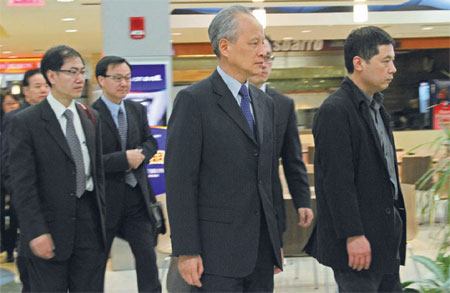Boston begins healing after tragedy
Updated: 2013-04-22 12:28
By Zhang Yuwei and Hu Haidan in Boston (China Daily)
|
|||||||||
|
Chinese Ambassador to the United States Cui Tiankai (center) and a relative of Lu Lingzi, who was killed in the Boston explosions on Monday, walk out of Logan International Airport in Boston on Friday. The family of Lu, a student at Boston University, traveled with assistance from the Chinese embassy in the US and the US embassy in Beijing. Zhang Yuwei / China Daily |
The community cheered the work of law enforcement officers in arresting the only surviving suspect in the Boston Marathon bomb blasts, but many hearts remained heavy due to the lives cut short or forever altered by the violence.
The Boston Red Sox returned to their home field, Fenway Park, on Saturday after postponing Friday night's game because of the citywide lockdown prompted by a daylong search for the second bombing suspect. Before the game, players and fans observed a moment of silence for the three victims of the attack one week ago and the Massachusetts Institute of Technology campus police officer who was killed in a confrontation with the suspects on Thursday.
The three killed in the explosions included Lu Lingzi, 23, a native of the northeastern Chinese city of Shenyang who was a graduate student at Boston University. More than 170 people were injured, many severely, by the blasts near the finish line of the marathon.
"What I'm really upset about, beyond the fact that they did this, are the three lives that were lost," said Luis Vasquez, who attended the same high school as bombing suspects Tamerlan and Dzhokhar Tsarnaev.
"The Chinese student - her family let her come this way and they put her in our hands; they saw America as a great opportunity for her to grow and to be the best she could be, and we failed. We didn't do that job because of two lunatics," Vasquez said.
Cui Tiankai, China's ambassador to the United States, and representatives from Boston University went to Logan International Airport on Friday night to meet Lu's family, who had flown in from China.
After arriving in Boston from Washington around noon on Friday, the ambassador first visited Zhou Danling, a female graduate student at Boston University who was injured in the bombings, at Boston Medical Center.
Cui said Zhou was in a stable condition and that they spoke briefly.
"She is doing well, better than I expected. She is getting better and she's keeping a positive attitude," Cui said after the visit. "She is still unable to eat normally and said she misses Chinese food very much. We promised we would treat her to a great meal once she fully recovers."
Zhou's mother also arrived in Boston from China on Friday.
The ambassador said the Chinese government appreciated US support to the victims' families.
Cui said Zhou expressed her gratitude to Chinese students from Boston University and schools in other cities who have come to visit her in the hospital. The student in actuarial science plans to continue her studies at BU once she recovers.
Lu was with Zhou and another Chinese friend, also a BU student, near the marathon finish line on Boylston Street when the bombs - modified pressure cookers stuffed with metal and placed in backpacks - exploded. The third student, Qian Tingting was unhurt.
A scholarship in Lu's honor was set up at BU and has already received more than $560,000 in funding. On Monday evening the university will conduct a memorial service for Lu.
Guo Shuang, a Chinese student at BU who represents the university's Chinese Scholars and Students Association, said she felt relieved and safe after news that the second suspect, 19-year-old Dzhokhar Tsarnaev, had been captured.
"Finally, the tragedy is over. That's what we've been waiting for the entire week," she said.
Guo and her classmates were surprised at the quick response from the Chinese consulate in New York to the blasts.
"The day after the blasts, consular officials called me and asked about the Chinese victims and said they were on their way to help," the student said.
"The tragedy brought us together - close and strong. Chinese students from Boston University and even other schools and cities have worked to help the victims and their families."
Police took the younger Tsarnaev into custody near the end of a day in which the other suspect - his 26-year-old brother - was killed in a confrontation with police. The suspect was found hiding inside a boat stored in the backyard of a house in the Boston suburb of Watertown, Massachusetts, after a manhunt that had led police to ask residents to stay indoors for their safety.
"News that the suspect has been brought to justice cannot make up for Lu's family's loss, but it may bring them some comfort," said Cui.
The Tsarnaev brothers are ethnic Chechens - one from Kyrgyzstan in Central Asia, the other from Russia's restive region of Dagestan in the Caucasus Mountains. Their family was granted political asylum in the US in 2002.
On Sunday, federal prosecutors were preparing criminal charges against Dzhokhar Tsarnaev. He was seriously wounded, probably in the same standoff in which his brother was killed, and has been unable to speak since being captured and transported to Boston's Beth Israel Deaconess Medical Center.
The suspect, who is in the hospital's intensive-care unit, was awake and responding in writing to questions from authorities, several US news outlets reported. Tsarnaev was being treated for a gunshot in the mouth that exited the back of his neck, Boston Police Commissioner Ed Davis told CBS' 60 Minutes in an interview.
Contact the writers through yuweizhang@chinadailyusa.com

 Obama celebrates young inventors at science fair
Obama celebrates young inventors at science fair
 Earth Day marked around the world
Earth Day marked around the world
 Volunteer team helping students find sense of normalcy
Volunteer team helping students find sense of normalcy
 Ethnic groups quick to join rescue efforts
Ethnic groups quick to join rescue efforts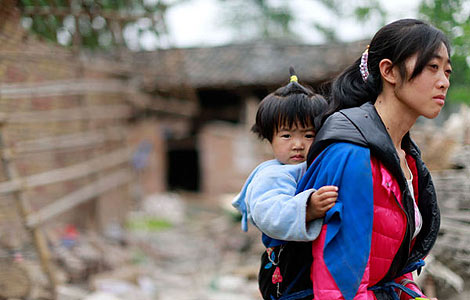
 Earthquake leaves family shattered
Earthquake leaves family shattered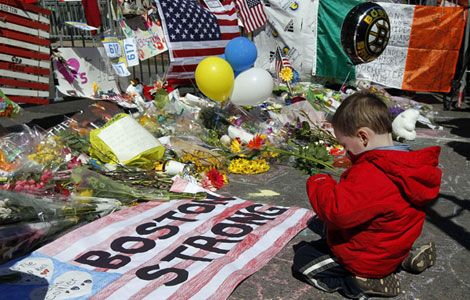
 Boston Marathon bombing suspect charged
Boston Marathon bombing suspect charged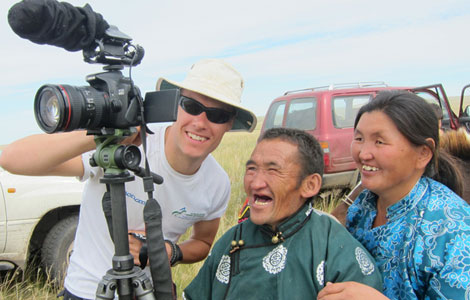
 Chasing vestiges of the Great Wall
Chasing vestiges of the Great Wall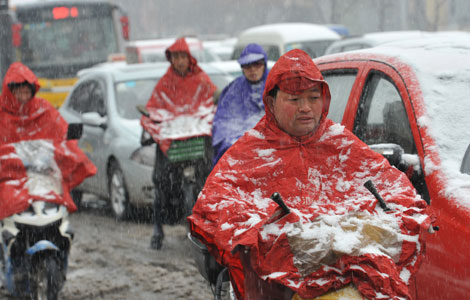
 Weekly Photos: April 15-21
Weekly Photos: April 15-21
Most Viewed
Editor's Picks

|

|

|

|

|

|
Today's Top News
Russia criticizes US reports on human rights
China 'aims to share its dream with world'
Chinese president appoints 5 new ambassadors
Nation's IPR suits see spike in 2012
H7N9 not spread between humans: WHO
Health new priority for quake zone
Sino-US shared interests emphasized
China, ROK criticize visits to shrine
US Weekly

|

|
